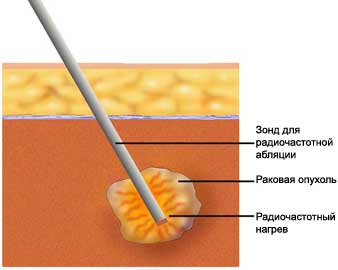Radiofrequency ablation
Description radiofrequency ablation
Radiofrequency ablation – kateternaya procedure, which uses heat to destroy abnormal tissue.
Reasons for radiofrequency ablation
Radiofrequency ablation is used to treat the following diseases:
- Cancerous tumors in the liver, bones, kidney, mammary gland, lung or adrenal glands, particularly those, which can not be cured by surgery and / or Chemotherapy (often used to treat tumors overgrown);
- Cardiac arrhythmia (irregular and / or rapid heart rate);
- Benign prostatic hyperplasia (DGPŽ) – state, in which the enlarged portion of the prostate gland can compress the urethra;
- The areas of the soft palate, which may be responsible for severe snoring and / or sleep apnea (period of time, during sleep when breathing stops);
- The pain from tumors or soft tissue disorders;
- Severe pain in the nerve;
- Varicose veins.
Possible complications of radiofrequency ablation
Complications are rare, but the procedure does not guarantee the absence of risk. If you plan to radiofrequency ablation, you need to know about possible complications, which may include:
- Discomfort;
- Bruising or bleeding;
- Infection;
- The collapse of the lung with a probe (When the procedure involves surgery on the lung, liver, the upper part of the kidney);
- Blood clots, damage to the heart muscle or blood tract after the procedure on the heart;
- Hepatophyma (slight, localized collection of pus in the cavity of the destroyed tissue);
- Tissue damage, surrounding the treatment area;
Factors, that may increase the risk of complications:
- Bleeding;
- Active infection.
How is radiofrequency ablation?
Preparation for the procedure
Your doctor may prescribe:
- Blood tests;
- Electrocardiogram – test, which records electrical currents, passing through the heart muscle;
- Medical imaging tests – X-ray, Ultrasound or MRI.
Ask the doctor, whether you can eat or drink fluids before the procedure.
Anesthesia
Probably, It will be used sedative, to help you relax. To numb the area using local anesthesia surgery. If radiofrequency ablation is carried out in the framework of another operation, may be used general spinalynaya or anesthesia.
Procedure radiofrequency ablation
For administration of fluids and medications installed catheter. Will control pulse, breathing and blood pressure. Field insertion of the probe will anesthetize.
The probe will be summed or directly introduced into the abnormal tissue. For precise positioning of the probe can be used CT, US or MRT. In some cases, surgery is administered to a plurality of electrodes. This will allow the doctor to cover a larger area of tissue.
The probe heats and destroys the abnormal tissue. In some cases, the probe may be re-introduced, to destroy another area of abnormal tissue.

Immediately after the procedure, radiofrequency ablation
You must stay in bed for a while 2-3 hours after treatment.
How long will radiofrequency ablation?
About 10-60 minutes.
Radiofrequency ablation – Will it hurt?
Anesthesia will prevent pain during surgery. To prevent pain or discomfort after treatment, They will be appointed painkillers.
The average time of stay in the hospital after radiofrequency ablation
The most common statement is available in the day of the procedure. Maybe, you have to stay in hospital overnight, to monitor the state of the body.
Care after radiofrequency ablation
Do not drive within the first 24 hours after treatment. Also, you may be asked to avoid stress. Be sure to follow your doctor's instructions.
Contact your doctor after radiofrequency ablation
After discharge from the hospital need to see a doctor, If the following symptoms:
- Signs of infection, including fever and chills;
- Redness, edema, strong pain, bleeding, or any discharge from the incision;
- Pain, which does not pass after taking pain medication appointed;
- Cough, breathlessness, palpitations or chest pain;
- Nausea and vomiting.
